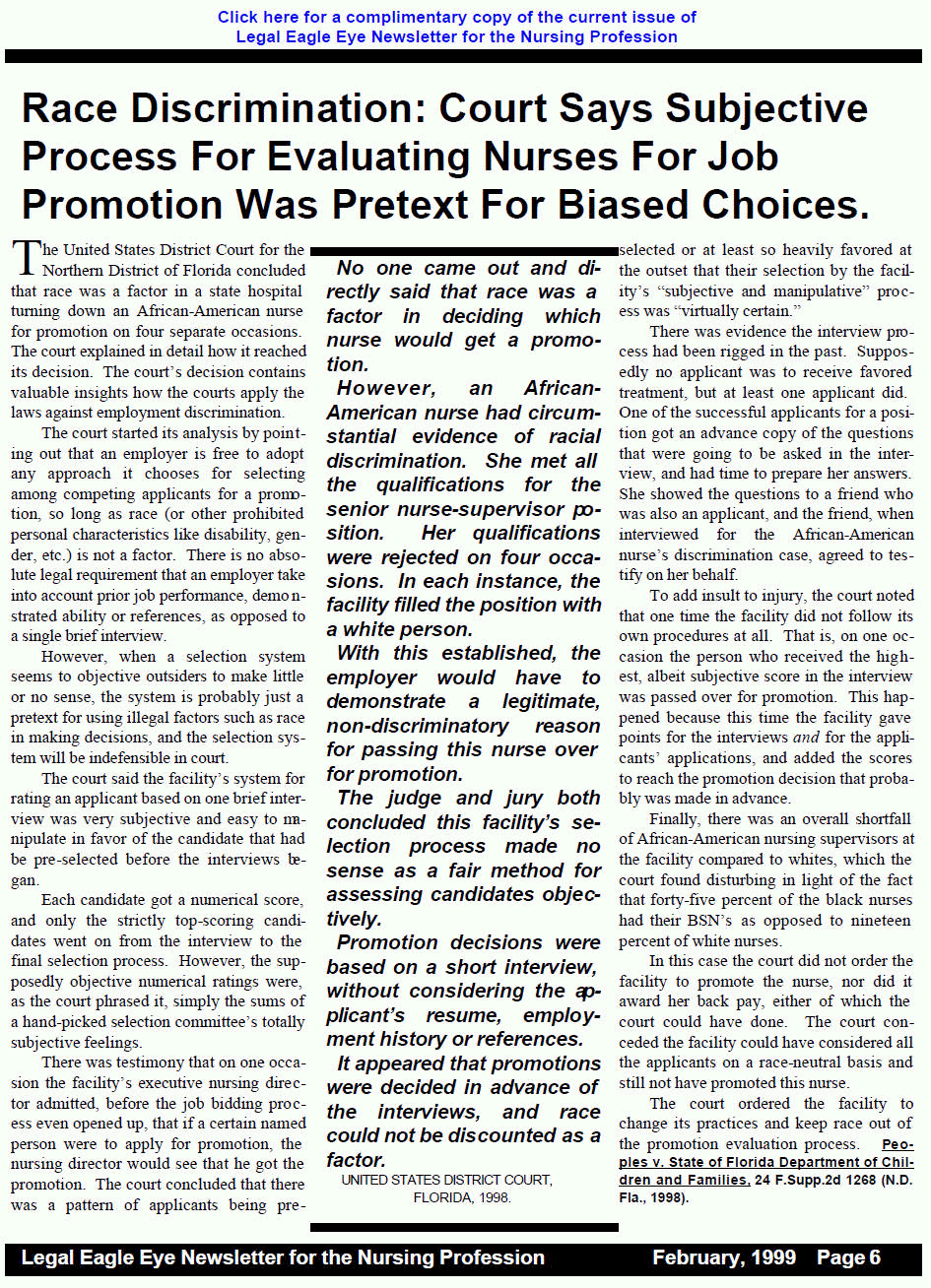
Quick Summary: An African-American nurse had circumstantial evidence of racial discrimination. She met all the qualifications for the senior nurse-supervisor position. Her qualifications were rejected on four occasions. In each instance, the facility filled the position with a white person.
No one came out and directly said that race was a factor in deciding which nurse would get a promotion.
With this established, the employer would have to demonstrate a legitimate, non-discriminatory reason for passing this nurse over for promotion.
The judge and jury both concluded this facility’s selection process made no sense as a fair method for assessing candidates objectively.
Promotion decisions were based on a short interview, without considering the applicant’s resume, employment history or references.
It appeared that promotions were decided in advance of the interviews, and race could not be discounted as a factor. UNITED STATES DISTRICT COURT, FLORIDA, 1998.
The United States District Court for the Northern District of Florida concluded that race was a factor in a state hospital turning down an African-American nurse for promotion on four separate occasions. The court explained in detail how it reached its decision. The court’s decision contains valuable insights how the courts apply the laws against employment discrimination.
The court started its analysis by pointing out that an employer is free to adopt any approach it chooses for selecting among competing applicants for a promotion, so long as race (or other prohibited personal characteristics like disability, gender, etc.) is not a factor. There is no absolute legal requirement that an employer take into account prior job performance, demonstrated ability or references, as opposed to a single brief interview.
However, when a selection system seems to objective outsiders to make little or no sense, the system is probably just a pretext for using illegal factors such as race in making decisions, and the selection system will be indefensible in court.
The court said the facility’s system for rating an applicant based on one brief interview was very subjective and easy to manipulate in favor of the candidate that had be pre-selected before the interviews began.
Each candidate got a numerical score, and only the strictly top-scoring candidates went on from the interview to the final selection process. However, the supposedly objective numerical ratings were, as the court phrased it, simply the sums of a hand-picked selection committee’s totally subjective feelings.
There was testimony that on one occasion the facility’s executive nursing director admitted, before the job bidding process even opened up, that if a certain named person were to apply for promotion, the nursing director would see that he got the promotion. The court concluded that there was a pattern of applicants being pre-selected or at least so heavily favored at the outset that their selection by the facility’s "subjective and manipulative" process was "virtually certain."
There was evidence the interview process had been rigged in the past. Supposedly no applicant was to receive favored treatment, but at least one applicant did. One of the successful applicants for a position got an advance copy of the questions that were going to be asked in the interview, and had time to prepare her answers. She showed the questions to a friend who was also an applicant, and the friend, when interviewed for the African-American nurse’s discrimination case, agreed to testify on her behalf.
To add insult to injury, the court noted that one time the facility did not follow its own procedures at all. That is, on one occasion the person who received the highest, albeit subjective score in the interview was passed over for promotion. This happened because this time the facility gave points for the interviews and for the applicants’ applications, and added the scores to reach the promotion decision that probably was made in advance.
Finally, there was an overall shortfall of African-American nursing supervisors at the facility compared to whites, which the court found disturbing in light of the fact that forty-five percent of the black nurses had their BSN’s as opposed to nineteen percent of white nurses.
In this case the court did not order the facility to promote the nurse, nor did it award her back pay, either of which the court could have done. The court conceded the facility could have considered all the applicants on a race-neutral basis and still not have promoted this nurse.
The court ordered the facility to change its practices and keep race out of the promotion evaluation process. Peoples v. State of Florida Department of Children and Families, 24 F.Supp.2d 1268 (N.D. Fla., 1998).